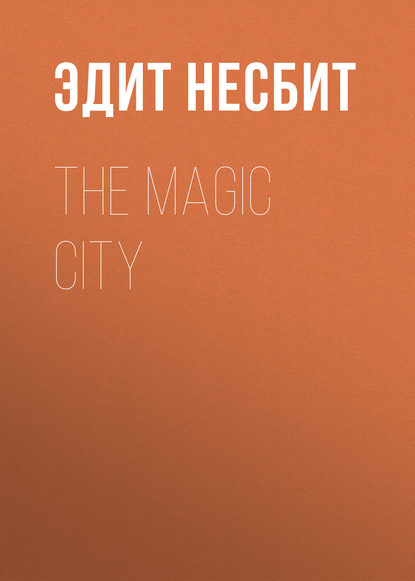По всем вопросам обращайтесь на: info@litportal.ru
(©) 2003-2024.
✖
The Magic City
Настройки чтения
Размер шрифта
Высота строк
Поля
'Very well,' said the judge. 'Then you know quite enough. Now I want to ask a little favour of you both. Would you mind escaping?'
'If we only could,' Lucy sighed.
'The strain on my nerves is too much,' said Mr. Noah feelingly. 'Escape, my dear children, to please me, a very old man in indifferent health and poor spirits.'
'But how–'
'Oh, you just walk out. You, my boy, can disguise yourself in your dressing-gown which I see has been placed on yonder chair, and I will leave my cloak for you, little girl.'
They both said 'Thank you,' and Lucy added: 'But how?'
'Through the door,' said the judge. 'There is a rule about putting prisoners on their honour not to escape, but there have not been any prisoners for so long that I don't suppose they put you on honour. No? You can just walk out of the door. There are many charitable persons in the city who will help to conceal you. The front-door key turns easily, and I myself will oil it as I go out. Good-bye—thank you so much for falling in with my little idea. Accept an old man's blessing. Only don't tell the gaoler. He would never forgive me.'
He got off his mat, rolled it up and went.
'Well!' said Lucy.
'Well!' said Philip.
'I suppose we go?' he said. But Lucy said, 'What about the gaoler? Won't he catch it if we bolt?'
Philip felt this might be true. It was annoying, and as bad as being put on one's honour.
'Bother!' was what he said.
And then the gaoler came in. He looked pale and worried.
'I am so awfully sorry,' he began. 'I thought I should enjoy having you here, but my nerves are all anyhow. The very sound of your voices. I can't write a line. My brain reels. I wonder whether you'd be good enough to do a little thing for me? Would you mind escaping?'
'But won't you get into trouble?'
'Nothing could be worse than this,' said the gaoler, with feeling. 'I had no idea that children's voices were so penetrating. Go, go. I implore you to escape. Only don't tell the judge. I am sure he would never forgive me.'
After that, what prisoner would not immediately have escaped?
The two children only waited till the sound of the gaoler's keys had died away on the stairs, to open their door, run down the many steps and slip out of the prison gate. They walked a little way in silence. There were plenty of people about, but no one seemed to notice them.
'Which way shall we go?' Lucy asked. 'I wish we'd asked him where the Charitables live.'
'I think,' Philip began; but Lucy was not destined to know what he thought.
There was a sudden shout, a clattering of horses' hoofs, and all the faces in the square turned their way.
'They've seen us,' cried Philip. 'Run, run, run!'
He himself ran, and he ran toward the gate-house that stood at the top of the ladder stairs by which they had come up, and behind him came the shouting and clatter of hot pursuit. The captain stood in the gateway alone, and just as Philip reached the gate the captain turned into the guard-room and pretended not to see anything. Philip had never run so far or so fast. His breath came in deep sobs; but he reached the ladder and began quickly to go down. It was easier than going up.
He was nearly at the bottom when the whole ladder bridge leapt wildly into the air, and he fell from it and rolled in the thick grass of that illimitable prairie.
All about him the air was filled with great sounds, like the noise of the earthquakes that destroy beautiful big palaces, and factories which are big but not beautiful. It was deafening, it was endless, it was unbearable.
Yet he had to bear that, and more. And now he felt a curious swelling sensation in his hands, then in his head—then all over. It was extremely painful. He rolled over in his agony, and saw the foot of an enormous giant quite close to him. The foot had a large, flat, ugly shoe, and seemed to come out of grey, low-hanging, swaying curtains. There was a gigantic column too, black against the grey. The ladder bridge, cast down, lay on the ground not far from him.
Pain and fear overcame Philip, and he ceased to hear or feel or know anything.
When he recovered consciousness he found himself under the table in the drawing-room. The swelling feeling was over, and he did not seem to be more than his proper size.
He could see the flat feet of the nurse and the lower part of her grey skirt, and a rattling and rumbling on the table above told him that she was doing as she had said she would, and destroying his city. He saw also a black column which was the leg of the table. Every now and then the nurse walked away to put back into its proper place something he had used in the building. And once she stood on a chair, and he heard the tinkling of the lustre-drops as she hooked them into their places on the chandelier.
'If I lie very still,' said he, 'perhaps she won't see me. But I do wonder how I got here. And what a dream to tell Helen about!'
He lay very still. The nurse did not see him. And when she had gone to her breakfast Philip crawled out.
Yes, the city was gone. Not a trace of it. The very tables were back in their proper places.
Philip went back to his proper place, which, of course, was bed.
'What a splendid dream,' he said, as he cuddled down between the sheets, 'and now it's all over!'
Of course he was quite wrong.
CHAPTER III
LOST
Philip went to sleep, and dreamed that he was at home again and that Helen had come to his bedside to call him, leading a white pony that was to be his very own. It was a pony that looked clever enough for anything, and he was not surprised when it shook hands with him; but when it said, 'Well, we must be moving,' and began to try to put on Philip's shoes and stockings, Philip called out, 'Here, I say, stop that,' and awoke to a room full of sunshine, but empty of ponies.
'Oh, well,' said Philip, 'I suppose I'd better get up.' He looked at his new silver watch, one of Helen's parting presents, and saw that it marked ten o'clock.
'I say, you know,' said he to the watch, 'you can't be right.' And he shook it to encourage it to think over the matter. But the watch still said 'ten' quite plainly and unmistakably.
Now the Grange breakfast time was at eight. And Philip was certain he had not been called.
'This is jolly rum,' he remarked. 'It must be the watch. Perhaps it's stopped.'
But it hadn't stopped. Therefore it must be two hours past breakfast time. The moment he had thought this he became extremely hungry. He got out of bed as soon as he knew exactly how hungry he was.
There was no one about, so he made his way to the bath-room and spent a happy hour with the hot water and the cold water, and the brown Windsor soap and the shaving soap and the nail brush and the flesh brush and the loofahs and the shower bath and the three sponges. He had not, so far, been able thoroughly to investigate and enjoy all these things. But now there was no one to interfere, and he enjoyed himself to that degree that he quite forgot to wonder why he hadn't been called. He thought of a piece of poetry that Helen had made for him, about the bath; and when he had done playing he lay on his back in water that was very hot indeed, trying to remember the poetry. The water was very nearly cold by the time he had remembered the poetry. It was called Dreams of a Giant Life, and this was it.
DREAMS OF A GIANT LIFE
What was I once—in ages long ago?
I look back, and I see myself. We grow
So changed through changing years, I hardly see
How that which I look back on could be me?[1 - Never mind grammar.]
Glorious and splendid, giant-like I stood
On a white cliff, topped by a darkling wood.

















